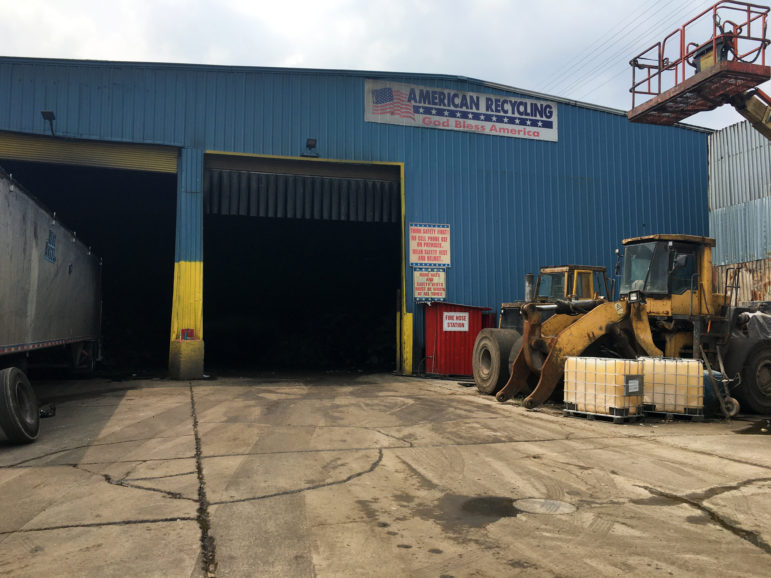Two waste processing companies in Queens, whose permitted capacity may be increased under the legislation, are also facing a potential lawsuit alleging they are in violation of the Clean Water Act.

Liz Donovan
American Recycling in Jamaica, Queens, is one of the facilities that would be allowed to increase its capacity under the new bill.Editor’s note: This story was updated at 1 p.m. on 7/30/21
The New York City Council is considering a bill that would allow waste transfer facilities in Queens to increase the capacity of tonnage they process. In exchange, the companies would have four years to switch a majority of the waste they transfer from truck cargo to rail.
The Council’s Committee on Sanitation and Solid Waste Management was scheduled to weigh in on the legislation—Intro 2349, introduced by Queens Councilmember I. Daneek Miller—on Thursday, but the meeting was deferred shortly before it began. The committee chair, Antonio Reynoso, is currently out of the country, his office said.
Environmental groups and some Queens residents oppose the bill, which will cause a partial rollback of the city’s Waste Equity Law (Local Law 152). That legislation, passed in 2018, reduced the amount of tonnage that companies that relied solely on truck transfers could accept, by 33 percent in Queens and the Bronx and 50 percent in Brooklyn. It aimed to solve an environmental injustice in which communities of color were exposed to truck traffic and pollution, on top of hosting the city’s waste processing facilities.
“For many, many years, three communities [Southeast Queens, the South Bronx and North Brooklyn] bore the brunt of processing all of the city’s waste,” said Melissa Iachan, an environmental justice attorney with New York Lawyers for the Public Interest, who advocated for the legislation.
The Waste Equity bill had to be introduced three times over nearly a decade before it was finally passed and signed into law by Mayor Bill de Blasio; it went into effect in October 2019. If Miller’s new bill passes, waste companies in certain neighborhoods will be eligible to have their permitted capacity raised back to where it was before the Waste Equity Law was passed, as long as they commit to converting to transfers by rail within the four-year time frame. Those who fail to make the conversion to rail in time would have their allowed capacity reduced again, according to the legislation.
Thursday morning, Reynoso’s office sent an email to fellow councilmembers opposing the language of the bill. The legislation as written stipulates that companies are only required to cart 51 percent of waste by rail to meet the law’s requirements, which Reynoso’s office claims won’t effectively reduce truck traffic in already overburdened communities.
Dominic Susino, the chief financial officer of American Recycling in Jamaica, Queens, said he and another waste transfer company next door are eager to make the change to rail transfers—using a switch owned by the nearby Long Island Rail Road—but will need the restored tonnage offered by Miller’s bill to be able to fund the project. He added that the loan the company receives to fund the construction to start rail exporting will also allow them to demolish and rebuild their outdated infrastructure, which allows for better odor and dust mitigation.
Iachan brushes off the argument as a company talking point.
“They should have been able to do the rail construction in advance of the Waste Equity Law taking effect, and they would’ve had the previous capacity to fund it and been able to avail themselves of the exemption for rail,” she said. “However, they simply chose to oppose the bill over and over, rather than get with the program when they could, and now want special treatment after the fact.”
Neighbors in the community around the facility say the smell and dirt are major issues that affect their quality of life.
“We’ve been fighting for a closure of the site so that the smell won’t leak out into the community,” said Jamaica resident Caroll Forbes, who lives several blocks from the site. “The smell is very, very bad. I can never open my front windows.”
The companies sit adjacent to Detective Keith L. Williams Park, where the odor of waste wafts across a running track and basketball courts.
Oster Bryan, who lives in the neighborhood and heads the St. Albans Civic Improvement Association, said that he’s visited other transfer stations in Queens and was shocked at the difference in how the odor was managed.
“To see how they function compared to how this one functions, you realize an injustice is occurring,” he said. “We were inside and a garbage truck was right beside us unloading, and it smelled better at that point than walking down Liberty Boulevard near the waste transfer station.”
Susino said the company is prepared to make the changes necessary to be a good neighbor.
The office, located in a trailer that’s accessed by sidestepping puddles and mud on the unpaved Douglas Avenue, is decorated with pictures of a Little League team sponsored by the company and plaques thanking owner Chris Hein for his philanthropic missions.
A model of the reimagined facility they’re hoping to build sits on the conference table, showing a fully enclosed building topped with solar panels, a classroom where neighborhood kids can learn about recycling and trees along the exterior.
The current building, which Susino said was built in the 1990s, is open in the front, allowing the odor of garbage and construction waste to seep out.
Susino said that the passage of Miller’s bill and the additional capacity will allow them to fund those renovations. “We want [the community] to know we’re here, without knowing we’re here in a negative way.”
The Council vote comes just 10 days after New York Lawyers for the Public Interest sent Notices of Intent to Sue on behalf of two environmental groups to the facility, as well as another waste transfer station next door, allegeding the companies are violating the federal Clean Water Act by allowing wastewater to enter storm drains and pollute Jamaica Bay.
Susino would not comment on the lawsuit but said that the water from his facility is self-contained and that the company has never been cited.
The other transfer station the planned lawsuit targets, Regal Recycling, is located along the same stretch of Douglas Avenue and has been cited multiple times for various violations at the state and federal level. In 2019, it was fined $10,000 by the New York Department of Environmental Conservation in part for washing equipment in an area without drainage controls. In 2009, three workers died after inhaling hydrogen sulfide gas in a dry well, and the company was fined $79,000 by the U.S. Department of Labor’s Occupational Safety and Health Administration.
Regal Recycling did not immediately return a call seeking comment Thursday morning. Reynoso’s office also noted the company’s past in its letter to the Council.
“The companies lobbying for this legislation were active opponents of the original waste equity bill and are the subject of a pending lawsuit alleging illegal, environmentally harmful operations at their facility,” wrote Jennifer Gutierrez, Reynoso’s chief of staff. “The proposed legislation does not achieve the goals of the original waste equity bill and would cause further harm to communities, while benefiting the private interests of companies who have a proven history as bad actors.”
A DEC spokesperson said both American and Regal are currently in compliance with the agency’s enforcement orders regarding past violations.
Some critics also take issue with the speed with which the legislation was moving forward. Miller’s bill was introduced in June, and was intially scheduled for a committee vote on Thursday—leading those who oppose it to accuse Miller of “jamming” the legislation through.
“It’s very strange that it took us 10 years to pass Waste Equity but it’s taking under two months to reverse a portion of it,” said Iachan.
Miller’s office pushes back on the claim that the legislation is being rushed, and said the proposal has been discussed in multiple public meetings over the course of at least six months. “I wouldn’t agree that it’s going through quickly,” said Ali Rasoulinejad|, Miller’s chief of staff.
But Bryan said that the bill is too light on details to hold the waste transfer companies accountable—and that restoring the tonnage to what it was before the Waste Equity bill was passed is going against the wishes of the community.
“These are requests that the community has been making for years that are falling on deaf ears,” he said, adding that he wants to see the American Recycling building fully enclosed.
“Listen, you have a business going and waste is an issue,” he said. “I just don’t want to smell it.”
Liz Donovan is a Report for America corps member.










3 thoughts on “NYC Council Considers Waste Transfer Bill That Would Roll Back Environmental Gains in Queens, Critics Say”
‘ waste companies in certain neighborhoods will be eligible to have their permitted capacity raised back to where it was before the Waste Equity Law was passed, as long as they commit to converting to transfers by rail within the four-year time frame. ‘
What about the waste facilities no where near a freight rail line? If they are forced to close, then what? There are only a few freight railroads running through NYC. Would the city allow a freight line to be accessed by allowing tracks to cross public streets, and install proper railroad crossing gates and lights?
‘ he and another waste transfer company next door are eager to make the change to rail transfers—using a switch owned by the nearby Long Island Rail Road ‘
Hard to tell from maps but the LIRR rail line near American Waste appears to be a passenger line, not a freight line.
These companies should be encircled by green zones, using trees and vegetation to absorb these odors. It should be noted that there are smell issues throughout other areas of the City. The solid waste treatment plant on Rockaway can be horrific. The same holds true for Owl’s Point off the Belt Parkway in Brooklyn. For the life of me, I’ve never understood why residential properties, and schools as on Rockaway, were built near those facilities? Maybe consideration should be given to moving people in close proximity out of those areas? The City could use this federal infrastructure monies to buy the properties around these waster treatment operations?
Meanwhile no one is willing to address the production of all this waste New Yorkers what to pass on. Waste removal is fundamental to the business cycle of continuous consumption. New Yorkers myst be aware by now, that when making any new purchase, we are really buying tomorrows waste.